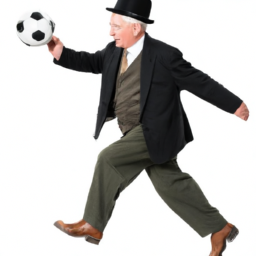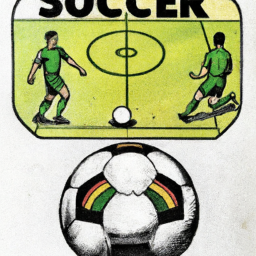

The evolution of soccer rules is a fascinating journey that spans centuries. Soccer's origins can be traced back to ancient civilizations, where ball games involving kicking were prevalent. However, it was in 19th-century England that soccer began to take shape with the standardization of rules.
One of the key milestones in the evolution of soccer rules was the formation of the Football Association (FA) in 1863. The FA established the Laws of the Game, which included fundamental rules such as the prohibition of using hands (except for the goalkeeper) and the offside rule. These rules laid the foundation for modern association football.
Over the years, the Laws of the Game have undergone refinements and updates to adapt to the changing nature of the sport.
FIFA, the Fédération Internationale de Football Association, has played a pivotal role in shaping the history of soccer. Founded in 1904, FIFA was established to oversee and promote international soccer competitions and ensure consistency in the sport's rules and regulations.
One of FIFA's most significant contributions to soccer history was organizing the first-ever FIFA World Cup in 1930. Scottish Football Association This historic event brought nations together in the spirit of competition and marked a major milestone in the sport's global development. Since then, the World Cup has become one of the most-watched sporting events globally.
FIFA continues to be the governing body for international soccer, overseeing various tournaments, including the FIFA World Cup, FIFA Women's World Cup, and numerous youth and regional competitions. Its commitment to promoting the sport and fostering unity among nations through soccer has solidified its place in soccer history.
Before the emergence of modern soccer, ancient civilizations around the world engaged in various ball games that bear similarities to the sport we know today. In ancient China, a game called "cuju" involved kicking a ball into a net, dating back to the 2nd century BC. Notts County FC Similarly, the Greeks played "episkyros," a game where two teams tried to get a ball past the opponent's goal line.
In Rome, a game known as "harpastum" featured teams trying to control a small ball and score by getting it past the opposing team's goal. These early ball games laid the groundwork for the development of soccer and provided a glimpse into the enduring human fascination with kicking a ball to achieve a common goal.
While these ancient ball games may not have adhered to modern soccer's rules, they showcase humanity's longstanding love for the sport. They serve as historical evidence of the game's evolution over centuries, from diverse cultures and regions.

England holds a special place in the history of soccer, as it played a pivotal role in shaping the sport we know today. In the 19th century, various schools and clubs across England began to standardize the rules of football. The efforts of these early pioneers culminated in the formation of the Football Association (FA) in 1863, a milestone that marked the birth of association football.
The FA's codification of the Laws of the Game provided a foundation for the sport's development and spread. England's influence extended globally, with the sport rapidly gaining popularity in other countries.
England's contribution to soccer extends beyond rule-making. The English Football League, founded in 1888, was the world's first football league, revolutionizing the organization of the sport. English clubs like Manchester United, Liverpool, and Arsenal have become iconic in the world of football, further solidifying England's legacy in the beautiful game.
Soccer's journey from its humble origins to becoming a global phenomenon is a testament to its universal appeal. While it began in England, the sport quickly transcended borders, captivating hearts and minds across continents.
British sailors, traders, and immigrants played a significant role in introducing soccer to different parts of the world. In South America, for instance, British workers in Argentina founded the first football club, sparking the birth of Argentine soccer. Similarly, soccer found its way to Africa, Asia, and Oceania through British influence and later, through international competitions.
Today, soccer stands as the world's most popular sport, with millions of fans, players, and clubs spanning the globe. The FIFA World Cup, held every four years, brings together nations from every corner of the world, showcasing soccer's ability to bridge cultural divides and unite people through the love of the game.


Soccer's history is rich with influential pioneers who have left an indelible mark on the sport.
Another influential pioneer is Charles W. Alcock, who organized the first-ever international soccer match between England and Scotland in 1872. This historic game laid the groundwork for international soccer competitions. Additionally, Héctor Cuper, a renowned Argentine coach, has made significant contributions to modern soccer coaching techniques and strategies.
These influential pioneers have helped shape the sport in various ways, from establishing its rules to promoting international competition and advancing coaching methodologies. Their dedication and vision continue to inspire soccer enthusiasts and contribute to the ongoing evolution of the game.
Soccer is not just about the sport itself; it's also about the historic clubs that have played a pivotal role in its growth. Clubs like Manchester United, Real Madrid, and Barcelona have become household names worldwide. Manchester United, for instance, has a storied history dating back to 1878 and has won numerous domestic and international titles.
Real Madrid, founded in 1902, is known for its rich tradition of success in European competitions, including the UEFA Champions League. Barcelona, founded in 1899, boasts a strong legacy of talented players and beautiful, possession-based football.
These historic clubs not only serve as symbols of excellence but also as cultural ambassadors, connecting fans from different parts of the world through their love for the game. Michel Platini Their contributions to soccer history are deeply intertwined with the sport's global appeal.

Answer: The term 'football' historically referred to games played on foot, as opposed to on horseback. Since soccer involves players using their feet to control the ball, it was naturally called 'football'. The name 'soccer' originated as a slang abbreviation of 'association football' in England but became more commonly used in countries where 'football' referred to different sports, like American football in the United States.
Answer: Modern soccer originated in England in the mid-19th century. Schools and clubs played their own versions of football with varied rules. In 1863, representatives from different clubs met in London and formed the Football Association, unifying the rules of the game and laying the foundation for modern soccer.